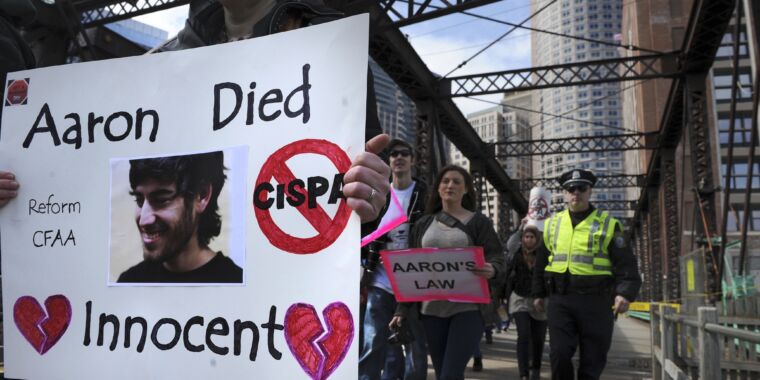Supreme Courtroom reins in definition of crime below controversial hacking regulation


Getty Photos | Boston Globe
The Supreme Courtroom issued a ruling Thursday that imposes a restrict on what counts as a criminal offense under the Personal computer Fraud and Abuse Act (CFAA).
The circumstance includes a previous Georgia police sergeant who “used his personal, valid credentials” to get information and facts about a license plate quantity from a legislation enforcement database, the courtroom selection reported. The sergeant ran the research in trade for revenue and for non-law enforcement applications, violating a division coverage. He was billed with a felony under the CFAA, which suggests it can be a crime when an individual “intentionally accesses a computer system without the need of authorization or exceeds licensed obtain.” He was convicted and sentenced to 18 months in jail in Might 2018.
A federal appeals courtroom upheld the conviction, but the Supreme Court docket reversed it nowadays in a 6-3 choice that explained Van Buren did not violate the CFAA. Justices observed that the cybersecurity statute does not make it a criminal offense to acquire facts from a computer when the particular person has approved accessibility to that machine, even if the particular person has “poor motives.”
The court docket wrote:
Nathan Van Buren, a former police sergeant, ran a license-plate look for in a legislation enforcement pc database in exchange for income. Van Buren’s conduct plainly flouted his department’s policy, which licensed him to receive databases details only for regulation enforcement uses. We have to come to a decision whether or not Van Buren also violated the Laptop or computer Fraud and Abuse Act of 1986 (CFAA), which tends to make it illegal “to access a computer with authorization and to use these kinds of access to attain or alter facts in the laptop that the accesser is not entitled so to acquire or alter.”
He did not. This provision addresses those people who get hold of facts from individual places in the computer—such as data files, folders, or databases—to which their laptop or computer entry does not extend. It does not go over individuals who, like Van Buren, have improper motives for obtaining info that is otherwise available to them.
“The get-togethers concur that Van Buren accessed the regulation enforcement databases system with authorization,” the ruling stated. “The only concern is regardless of whether Van Buren could use the procedure to retrieve license-plate facts. The two sides agree that he could. Van Buren accordingly did not ‘excee[d] authorized access’ to the databases, as the CFAA defines that phrase, even although he acquired info from the database for an incorrect objective. We hence reverse the opposite judgment of the Eleventh Circuit and remand the scenario for even further proceedings steady with this impression.”
Van Buren caught in FBI sting
Van Buren’s disputed laptop obtain transpired after he questioned a guy named Andrew Albo for a mortgage. Albo secretly recorded the discussion “and took it to the neighborhood sheriff’s business office, where he complained that Van Buren experienced sought to ‘shake him down’ for cash,” the ruling reported. The FBI obtained associated and devised an operation in which “Albo would inquire Van Buren to search the state legislation enforcement laptop or computer databases for a license plate purportedly belonging to a girl whom Albo experienced satisfied at a local strip club. Albo, no stranger to lawful troubles, would explain to Van Buren that he desired to ensure that the girl was not in point an undercover officer. In return for the lookup, Albo would pay out Van Buren about $5,000,” the ruling ongoing.
Through oral arguments, Van Buren’s law firm contended that the government’s interpretation of the regulation would make it a crime to violate a website’s phrases of service or to use a enterprise e mail or Zoom account for personalized purposes if an employer had a coverage versus undertaking so. “This design would manufacturer most People criminals on a daily foundation,” the attorney, Jeff Fisher, informed justices.
The US Division of Justice argued that the government’s interpretation would not extend the regulation to general public internet sites, even if they need a username and password. As an alternative, the governing administration argued that its interpretation of the law applies only to men and women who are “akin to workers” and have been granted “distinct, individualized authorization.”
But as we wrote in our story on the oral arguments, the government’s argument “appears to be really hard to square with previous CFAA cases. TicketMaster’s web page, for case in point, is available to the typical public. Men and women who acquire tickets there are not ‘akin to employees.’ Nevertheless folks got prosecuted for scraping it. Likewise, JSTOR would not hand-select who is authorized to accessibility academic articles—yet [Aaron] Swartz was prosecuted for downloading them without authorization.”
Swartz dedicated suicide in 2013 when he was being prosecuted underneath the CFAA for downloading about 4 million academic journal papers from JSTOR around MIT’s personal computer community.
Ruling “radically limit[s]” scope of law
Harvard Regulation College Professor Lawrence Lessig applauded the ruling, creating that the court docket selection written by Justice Amy Coney Barrett “has radically limited the scope of the Computer system Fraud and Abuse Act—the statute that the United States stated @aaronsw [Aaron Swartz] experienced violated. Implementing Barrett’s reading, he plainly did not.”
Barrett’s greater part opinion was joined by Justices Stephen Breyer, Sonia Sotomayor, Elena Kagan, Neil Gorsuch, and Brett Kavanaugh. Justice Clarence Thomas filed a dissenting feeling, joined by Main Justice John Roberts and Justice Samuel Alito.
The ruling could have a main effect on government prosecutions. As justices wrote right now, the CFAA initially “barred accessing only specified monetary facts” but “has considering the fact that expanded to address any details from any pc ‘used in or influencing interstate or international commerce or conversation.’ As a outcome, the prohibition now applies—at a minimum—to all information from all computers that join to the Online.”
Violating the CFAA is punishable by fines and imprisonment of up to 10 yrs. The regulation also gives for civil liability, as individuals who endure “hurt” or “reduction” from CFAA violations can sue for damages.
Berkeley Legislation professor Orin Kerr pointed out one caveat that could possibly restrict the result of the Supreme Courtroom ruling. “In a footnote, the Courtroom seems to undertake the authentication test—’whether a user’s credentials permit him to carry on previous a computer’s entry gate’—that I and some others have proposed,” Kerr wrote. “But you can find a big caveat to that. In a diverse footnote, the Court suggests it is not reaching whether that ‘gate’ can be imposed only by technology, or by a deal or policy.”
Kerr added that it “could possibly nonetheless suggest a primarily technological exam, but just one that can be impacted by penned restrictions.”
Situation hinged on the term “so”
Van Buren appealed his conviction to the US Court of Appeals for the 11th Circuit, “arguing that the ‘exceeds approved access’ clause [in the CFAA] applies only to these who get info to which their personal computer accessibility does not prolong, not to individuals who misuse accessibility that they in any other case have,” present-day ruling stated. The appeals court docket ruled against him, but the Supreme Court docket reported it took up the situation to solve a split involving the 11th Circuit and “quite a few” other circuit appeals courts that “see the clause Van Buren’s way.”
The circumstance hinged on the word “so” as utilized in the CFAA’s prohibition on “attain[ing] or change[ing] data in the personal computer that the accesser is not entitled so to attain or alter.”
“The functions agree that Van Buren ‘access[ed] a laptop with authorization’ when he utilised his patrol-auto computer and valid credentials to log into the law enforcement databases. They also agree that Van Buren ‘obtain[ed]… details in the computer’ when he obtained the license-plate record for Albo. The dispute is no matter whether Van Buren was ‘entitled so to obtain’ the file,'” the courtroom wrote.
“Van Buren contends that the term ‘so’ serves as a time period of reference and that the disputed phrase as a result asks irrespective of whether a person has the right, in ‘the very same way as has been said,’ to get the applicable information and facts,” the ruling also reported. The US federal government “argues that ‘so’ sweeps more broadly, looking through the phrase ‘is not entitled so to obtain’ to refer to facts one particular was not authorized to obtain in the distinct method or circumstances in which he received it.”
The court’s the greater part reported it disagreed with the government simply because of how the statute is structured and “since with no ‘so,’ the statute could be go through to include all sorts of limitations on one’s entitlement to information and facts.”
“Van Buren’s account of ‘so’—namely, that ‘so’ references the earlier mentioned ‘manner or circumstance’ in the textual content of [the law] itself—is much more plausible than the Government’s,” the court wrote. “‘So’ is not a absolutely free-floating term that gives a hook for any limitation stated everywhere.” Referencing the Oxford English Dictionary and Webster’s Dictionary, the court wrote that “so” refers “to a stated, identifiable proposition from the ‘preceding’ text in fact, ‘so’ generally ‘[r]epresent[s]’ a ‘word or phrase presently employed,’ thereby preventing the want for repetition.”
US argument a “sleight of hand”
The the vast majority in addition uncovered that the government’s interpretation “has area attraction but proves to be a sleight of hand”:
Whilst highlighting that “so” refers to a “method or circumstance,” the Authorities at the same time ignores the definition’s more instruction that such manner or circumstance previously will “ha[ve] been said,” “asserted,” or “explained.” Under the Government’s solution, the pertinent circumstance—the a person rendering a person’s conduct illegal—is not recognized before in the statute. As a substitute, “so” captures any circumstance-primarily based restrict showing anywhere—in the United States Code, a point out statute, a personal agreement, or anywhere else. And even though the Government attempts to cabin its interpretation by suggesting that any these types of limit will have to be “especially and explicitly” stated, “express,” and “inherent in the authorization alone,” the Federal government does not discover any textual foundation for these guardrails.
Meanwhile, the dissenting viewpoint composed by Thomas would basically clear away the word “so” from the statute, the majority wrote:
The dissent accepts Van Buren’s definition of “so,” but would arrive at the Government’s result by way of the term “entitled.” In accordance to the dissent, the time period “entitled” needs a “circumstance dependent” evaluation of regardless of whether entry was good. But the phrase “entitled” is modified by the phrase “so to get hold of.” That phrase in switch directs the reader to look at a particular limitation on the accesser’s entitlement: his entitlement to attain the information and facts “in the fashion previously mentioned.” And as presently defined, the manner formerly mentioned is making use of a laptop or computer just one is licensed to entry. To get there at its interpretation, the dissent must generate the phrase “so” out of the statute.








